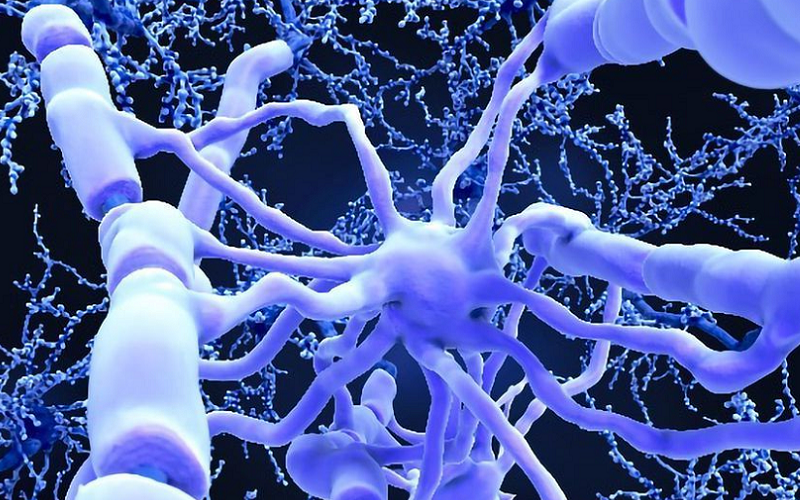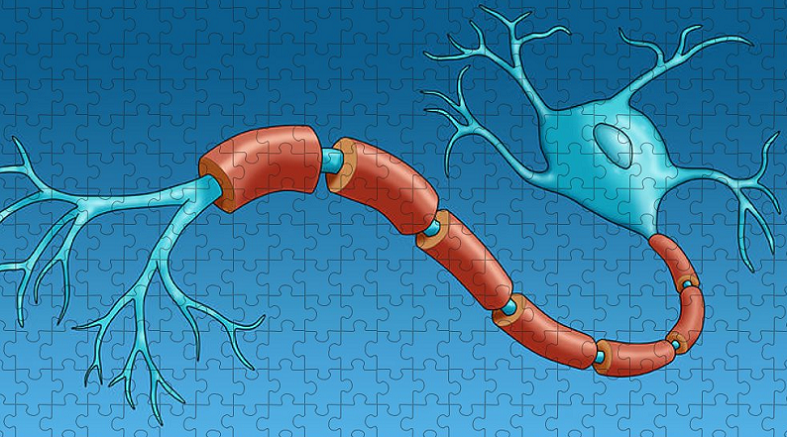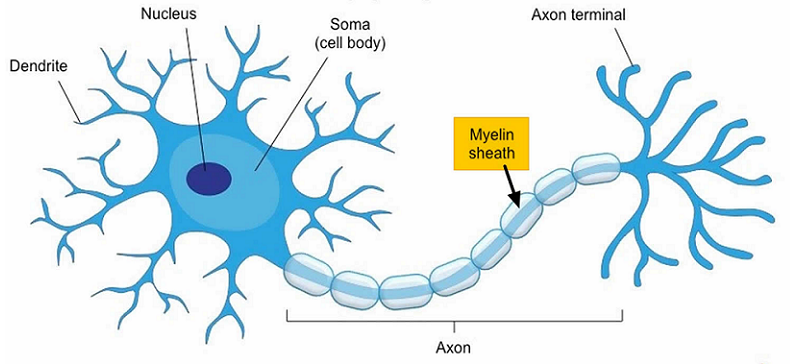
In the intricate world of neuroscience, the myelin sheath often goes unnoticed, overshadowed by neurons and synapses. Yet, this unsung hero plays a vital role in the efficiency and precision of neuronal communication, ultimately impacting our cognitive health. Here we delve into the essential functions of the myelin sheath and explore how it contributes to various aspects of our cognitive well-being. By understanding the importance of this remarkable structure, we can better appreciate its role in maintaining optimal brain function and take steps to support its health throughout our lives.
Contents
The Importance of Neuronal Communication
Neuronal communication is the foundation of all human experiences, from our most basic physiological processes to our most complex thoughts and emotions. This intricate system of signaling within the brain allows us to perceive the world around us, make decisions, and interact with others. It also plays a critical role in learning and memory, enabling us to acquire new skills, process information, and recall past experiences.
The efficiency and accuracy of neuronal communication are essential for cognitive health, as even minor disruptions can lead to significant impairments in our daily functioning. For example, delays in nerve impulse transmission can result in slowed reaction times, while signal degradation may lead to difficulty processing information or understanding complex concepts. As such, understanding the factors that influence neuronal communication, including the role of the myelin sheath, is vital for maintaining optimal brain function and overall cognitive well-being.
What is the Myelin Sheath?
The myelin sheath is a specialized, fatty layer that wraps around the axons of many nerve cells, particularly those in the central and peripheral nervous systems. It is composed of lipids (about 70%) and proteins (about 30%), which give it its unique insulating properties. The sheath is formed by glial cells—oligodendrocytes in the central nervous system and Schwann cells in the peripheral nervous system—that wrap their membranes around the axon in a spiral fashion, creating multiple layers of myelin.
Function in the Nervous System
The primary function of the myelin sheath is to insulate the axon and facilitate rapid transmission of electrical signals, known as action potentials. By increasing the speed of nerve impulses and reducing signal degradation, the myelin sheath enables efficient communication between neurons, which is crucial for cognitive processes such as learning, memory, and decision-making [1].
Myelination Process
Myelination, the process of forming the myelin sheath around axons, begins during fetal development and continues throughout childhood and adolescence. This process is influenced by various factors, including genetic, environmental, and nutritional elements. Myelination plays a critical role in cognitive development, as it coincides with key milestones such as language acquisition, motor skills development, and complex problem-solving abilities.
Role in Different Types of Neurons
Not all neurons are myelinated. Myelinated neurons are predominantly found in the central and peripheral nervous systems, where rapid and efficient signal transmission is essential for proper functioning. Unmyelinated neurons, on the other hand, are typically found in areas where the speed of communication is less critical, such as the enteric nervous system, which regulates digestion. The presence of myelin sheath around certain neurons highlights its importance in maintaining optimal neuronal communication and cognitive health.

How Myelin Sheath Facilitates Neuronal Communication
In the complex world of neuronal communication, the myelin sheath plays a crucial role in ensuring that signals are transmitted quickly and accurately between nerve cells.
Increasing Speed of Nerve Impulses
One of the most significant benefits of myelin sheath is the increased speed of nerve impulse transmission. Myelinated axons utilize a process called saltatory conduction, where action potentials “jump” between the gaps in the myelin sheath, known as Nodes of Ranvier. This allows electrical signals to travel rapidly along the axon without losing strength or encountering resistance.
In contrast, unmyelinated neurons transmit action potentials along the entire length of the axon, which is a slower and less efficient process. Myelinated neurons can transmit signals at speeds up to 120 meters per second, while unmyelinated neurons transmit at a rate of approximately 0.5-2 meters per second [2]. This increased speed is essential for the rapid communication required for complex cognitive tasks, such as processing sensory information or making split-second decisions.
Enhanced Signal Fidelity
The myelin sheath also serves as an insulator, preventing the leakage of electrical signals and reducing the chances of cross-talk between adjacent neurons. This insulation helps maintain the strength and fidelity of the action potential as it travels along the axon, ensuring that the intended message reaches its destination without interference.
Signal degradation is a common issue in neuronal communication, as electrical impulses can lose strength or become distorted as they travel along the axon. The myelin sheath helps to minimize this degradation by providing a protective barrier that preserves the integrity of the action potential. This is particularly important for long-range communication between distant brain regions, as it ensures that information can be accurately relayed and processed without significant loss or distortion.
Cognitive Health and Myelin Sheath
The myelin sheath is not only crucial for efficient neuronal communication but also plays a vital role in cognitive health.
Connection to Learning and Memory
The myelin sheath plays a critical role in neural plasticity, the brain’s ability to adapt and reorganize its connections in response to new experiences and learning. Myelination is essential for the formation and strengthening of neural pathways, which underlie the development of various cognitive skills. Research has shown that increased myelination is associated with improved learning and memory, as it enables more efficient and rapid communication between neurons.
The process of myelination coincides with key milestones in cognitive development, such as language acquisition, motor skills development, and complex problem-solving abilities. A well-developed myelin sheath is essential for the efficient transmission of information between brain regions, which enables optimal cognitive functioning. As such, disruptions in the myelination process can lead to significant impairments in learning and memory, affecting overall cognitive health [3].
Myelin Sheath Repair and Maintenance
Glial cells, including oligodendrocytes and Schwann cells, play a vital role in the repair and maintenance of the myelin sheath. These cells can produce new myelin in response to damage or degradation, helping to maintain the integrity of neuronal communication. This ability to repair and maintain the myelin sheath is essential for preserving cognitive function throughout life.
Various factors can influence the integrity of the myelin sheath, including genetic, environmental, and nutritional elements. For example, certain genetic mutations can lead to defects in myelin production or maintenance, while environmental factors such as toxins or infections can cause damage to the myelin sheath. Additionally, a balanced diet rich in essential nutrients is crucial for supporting the health of the myelin sheath and maintaining cognitive function.
Myelin-related disorders can have a profound impact on cognitive health, as they often involve damage or degradation of the myelin sheath, disrupting efficient neuronal communication.
Multiple Sclerosis
Multiple sclerosis (MS) is a chronic neurological disorder characterized by the immune system attacking and damaging the myelin sheath, leading to impaired nerve signal transmission. This demyelination can result in a wide range of cognitive symptoms, including memory loss, difficulty processing information, and slowed mental processing.
Leukodystrophies
Leukodystrophies are a group of genetic disorders that primarily affect the myelin sheath in the central nervous system. These conditions result in the progressive degeneration of myelin, leading to severe cognitive and motor impairments, depending on the specific type of leukodystrophy.
Other Demyelinating Conditions
Various other demyelinating conditions, such as Guillain-Barré syndrome, chronic inflammatory demyelinating polyneuropathy, and some forms of peripheral neuropathy, can also impact cognitive health by damaging the myelin sheath and disrupting neuronal communication [4]. These conditions highlight the importance of maintaining myelin integrity for optimal cognitive function.

Strategies to Promote Myelin Sheath Health
Maintaining and promoting the health of the myelin sheath is crucial for optimal cognitive function. By incorporating certain strategies into your daily life, you can actively contribute to preserving myelin integrity and promoting overall cognitive well-being.
Nutrition
A balanced diet rich in essential fatty acids, particularly omega-3 and omega-6, is crucial for maintaining the health of the myelin sheath. These fats are important building blocks for the myelin sheath and contribute to its structural integrity. Foods high in omega-3 fatty acids include fish, such as salmon and mackerel, as well as flaxseeds, chia seeds, and walnuts. Omega-6 fatty acids can be found in sources like vegetable oils, nuts, and seeds.
Certain vitamins and minerals play a key role in supporting myelin sheath health. For example, vitamin B12, found in animal products like meat, fish, and dairy, is essential for the maintenance and repair of myelin. Additionally, vitamin D, which can be obtained through sun exposure and certain foods, is crucial for proper immune function and has been linked to a reduced risk of developing multiple sclerosis. Other important nutrients for myelin health include vitamin B1, B6, and E, as well as minerals like copper, iodine, and zinc.
Physical Exercise
Engaging in regular aerobic exercise, such as jogging, swimming, or cycling, has been shown to promote myelin sheath health. Exercise stimulates the production of various growth factors that support the maintenance and repair of myelin, as well as improve overall brain function and cognitive health.
Resistance training, or weightlifting, has also been shown to have a positive impact on myelin sheath health. This form of exercise promotes the release of growth factors and hormones that support myelin maintenance and repair, while also improving overall cognitive function.
Mental Stimulation
Challenging your brain through cognitive training exercises, such as puzzles, memory games, and learning new skills, can help promote myelin sheath health. Mental stimulation encourages the formation of new neural connections and supports the maintenance of existing myelin, which contributes to optimal cognitive function [5].
Engaging in regular social interaction is another strategy for promoting myelin sheath health. Social activities stimulate the brain and encourage the release of various growth factors that support myelin maintenance and repair, contributing to overall cognitive well-being.
Sleep and Stress Management
Getting sufficient, high-quality sleep is crucial for maintaining myelin sheath health. During sleep, the brain undergoes essential repair and maintenance processes, including the removal of harmful waste products and the production of new myelin. Chronic sleep deprivation can impair these processes and negatively impact cognitive function.
Chronic stress can have detrimental effects on the myelin sheath and overall cognitive health. Developing healthy stress management techniques, such as meditation, yoga, deep breathing exercises, or engaging in hobbies, can help protect the myelin sheath from the damaging effects of stress and support overall cognitive well-being.

Nutritional Supplements That Benefit Myelin Sheath Health
While it is always good to obtain nutrients from a balanced diet, certain nutritional supplements may help further support myelin sheath health.
Omega-3 Fatty Acids
Omega-3 fatty acids, particularly eicosapentaenoic acid (EPA) and docosahexaenoic acid (DHA), are thought to benefit myelin sheath health through several mechanisms:
- Structural Component: DHA is a key structural component of neuronal cell membranes, including the myelin sheath. It helps to maintain the structural integrity and fluidity of cell membranes, which is essential for the proper functioning of neurons and the myelin sheath.
- Anti-inflammatory Properties: Omega-3 fatty acids have potent anti-inflammatory properties that can help protect the myelin sheath from damage caused by inflammation. Chronic inflammation has been linked to demyelinating conditions such as multiple sclerosis. By reducing inflammation, omega-3s may help prevent or slow down the progression of such conditions.
- Neuroprotective Effects: Omega-3 fatty acids, especially DHA, have been shown to promote neuronal survival and protect nerve cells from damage. This neuroprotective effect may help maintain the health of both the neurons and the myelin sheath.
- Promotion of Myelin Repair: Some studies suggest that omega-3 fatty acids may play a role in promoting myelin repair and regeneration. By enhancing the production and function of oligodendrocytes, the cells responsible for producing myelin in the central nervous system, omega-3s may support the restoration of damaged myelin sheaths.
- Improved Blood Flow: Omega-3 fatty acids can help improve blood flow by reducing blood viscosity, preventing platelet aggregation, and promoting vasodilation. Improved blood flow to the brain can enhance the delivery of nutrients and oxygen, which are essential for maintaining the health of neurons and the myelin sheath.
Acetyl L-Carnitine
Acetyl L-Carnitine (ALC) is an amino acid derivative that has been shown to potentially benefit myelin sheath health through several mechanisms [6]:
- Energy Production: ALC plays a crucial role in mitochondrial function, helping to transport fatty acids into the mitochondria for energy production. Since neurons and their myelin sheaths have high energy demands, maintaining efficient energy production is essential for their proper functioning and overall health.
- Neuroprotective Effects: ALC has been found to exhibit neuroprotective properties, which may help protect nerve cells and the myelin sheath from damage. Studies suggest that ALC can protect neurons from oxidative stress and other toxic insults, which may help maintain the health and integrity of the myelin sheath.
- Promotion of Myelin Repair: Some research indicates that ALC may promote myelin repair and regeneration by enhancing the function of oligodendrocytes, the cells responsible for producing myelin in the central nervous system. By stimulating the production of new myelin, ALC may contribute to the restoration of damaged myelin sheaths.
- Improved Nerve Conduction: ALC has been shown to improve nerve conduction velocity in some studies, which is crucial for efficient communication between neurons. By supporting the proper functioning of the myelin sheath, ALC may help maintain optimal neuronal communication and overall cognitive function.
Choline and Inositol
Choline and inositol are essential nutrients that play crucial roles in maintaining the health of cell membranes, including the myelin sheath [7]. They may benefit myelin sheath health through these mechanisms:
- Building Blocks of Myelin: Choline is a precursor to acetylcholine, a neurotransmitter involved in memory and cognitive function, and is also a component of phosphatidylcholine, a vital component of cell membranes. Inositol is a part of phosphatidylinositol, another essential component of cell membranes. Both phosphatidylcholine and phosphatidylinositol are necessary for the synthesis and maintenance of the myelin sheath.
- Nerve Signal Transmission: Choline and inositol are involved in the synthesis and function of neurotransmitters, which are necessary for nerve signal transmission. Proper nerve signal transmission is vital for efficient communication between neurons, which is heavily reliant on the integrity of the myelin sheath.
- Cell Membrane Integrity: Choline and inositol contribute to maintaining the structural integrity and fluidity of cell membranes, which is essential for the proper functioning of neurons and the myelin sheath. By supporting the health and function of cell membranes, choline and inositol may help maintain the overall health of the myelin sheath.
- Neuroprotective Effects: Both choline and inositol have been shown to exhibit neuroprotective properties, which may help protect nerve cells and the myelin sheath from damage. By supporting the health and function of neurons and the myelin sheath, choline and inositol may contribute to overall cognitive function and brain health.
Curcumin
Curcumin, the active compound found in turmeric, has been shown to potentially benefit myelin sheath health through the following mechanisms:
- Anti-inflammatory Properties: Curcumin has potent anti-inflammatory effects, which may help protect the myelin sheath from damage caused by inflammation. Chronic inflammation has been linked to demyelinating conditions such as multiple sclerosis. By reducing inflammation, curcumin may help prevent or slow down the progression of these conditions.
- Antioxidant Properties: Curcumin has powerful antioxidant properties that can help protect the myelin sheath from oxidative stress and damage. Oxidative stress can lead to the degradation of the myelin sheath, impairing nerve signal transmission and overall cognitive function. By neutralizing free radicals and reducing oxidative stress, curcumin may help maintain the health and integrity of the myelin sheath.
- Promotion of Myelin Repair: Some studies suggest that curcumin may promote myelin repair and regeneration by enhancing the function of oligodendrocytes, the cells responsible for producing myelin in the central nervous system. By stimulating the production of new myelin, curcumin may contribute to the restoration of damaged myelin sheaths.
- Neuroprotective Effects: Curcumin has been shown to exhibit neuroprotective properties, which may help protect nerve cells and the myelin sheath from damage. By supporting the health and function of neurons and the myelin sheath, curcumin may contribute to overall cognitive function and brain health.
References
[1] Regulation of Central Nervous System Myelination in Higher Brain Functions
[2] It feels instantaneous, but how long does it really take to think a thought?
[3] A comprehensive map of how Alzheimer’s affects the brain
[4] Neurogenesis: The Hidden Power of Adult Brain Growth and How to Stimulate It
[5] White Matter Plasticity Keeps the Brain in Tune: Axons Conduct While Glia Wrap
[6] Acetyl-l-carnitine enhances myelination of regenerated fibers of the lateral olfactory tract
[7] Pivotal role of choline metabolites in remyelination

